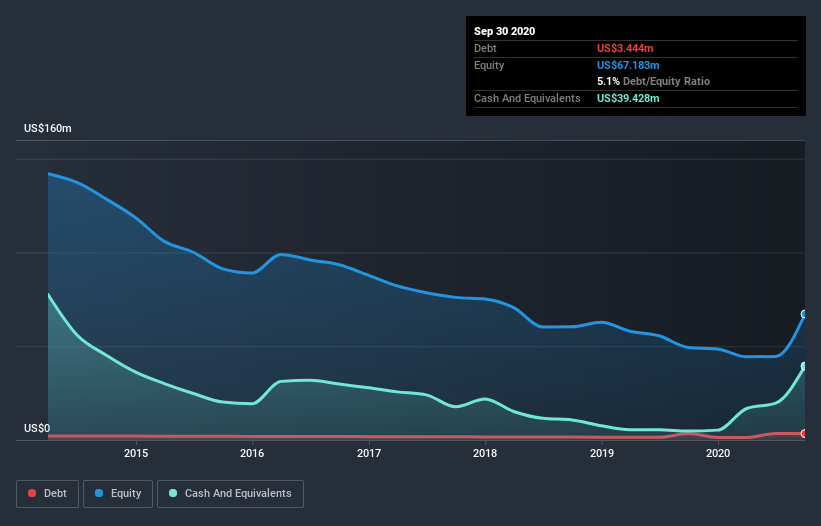Is ExOne (NASDAQ:XONE) Using Debt In A Risky Way?
David Iben put it well when he said, 'Volatility is not a risk we care about. What we care about is avoiding the permanent loss of capital.' So it seems the smart money knows that debt - which is usually involved in bankruptcies - is a very important factor, when you assess how risky a company is. As with many other companies The ExOne Company (NASDAQ:XONE) makes use of debt. But the real question is whether this debt is making the company risky.
Why Does Debt Bring Risk?
Debt and other liabilities become risky for a business when it cannot easily fulfill those obligations, either with free cash flow or by raising capital at an attractive price. If things get really bad, the lenders can take control of the business. However, a more usual (but still expensive) situation is where a company must dilute shareholders at a cheap share price simply to get debt under control. Of course, the upside of debt is that it often represents cheap capital, especially when it replaces dilution in a company with the ability to reinvest at high rates of return. When we think about a company's use of debt, we first look at cash and debt together.
View our latest analysis for ExOne
What Is ExOne's Net Debt?
The chart below, which you can click on for greater detail, shows that ExOne had US$3.44m in debt in September 2020; about the same as the year before. However, it does have US$39.4m in cash offsetting this, leading to net cash of US$36.0m.
How Strong Is ExOne's Balance Sheet?
According to the last reported balance sheet, ExOne had liabilities of US$25.7m due within 12 months, and liabilities of US$4.90m due beyond 12 months. Offsetting these obligations, it had cash of US$39.4m as well as receivables valued at US$5.77m due within 12 months. So it actually has US$14.6m more liquid assets than total liabilities.
This short term liquidity is a sign that ExOne could probably pay off its debt with ease, as its balance sheet is far from stretched. Simply put, the fact that ExOne has more cash than debt is arguably a good indication that it can manage its debt safely. When analysing debt levels, the balance sheet is the obvious place to start. But ultimately the future profitability of the business will decide if ExOne can strengthen its balance sheet over time. So if you want to see what the professionals think, you might find this free report on analyst profit forecasts to be interesting.
Over 12 months, ExOne made a loss at the EBIT level, and saw its revenue drop to US$59m, which is a fall of 2.5%. That's not what we would hope to see.
So How Risky Is ExOne?
We have no doubt that loss making companies are, in general, riskier than profitable ones. And we do note that ExOne had an earnings before interest and tax (EBIT) loss, over the last year. Indeed, in that time it burnt through US$14m of cash and made a loss of US$13m. However, it has net cash of US$36.0m, so it has a bit of time before it will need more capital. Even though its balance sheet seems sufficiently liquid, debt always makes us a little nervous if a company doesn't produce free cash flow regularly. The balance sheet is clearly the area to focus on when you are analysing debt. But ultimately, every company can contain risks that exist outside of the balance sheet. For example, we've discovered 3 warning signs for ExOne that you should be aware of before investing here.
If, after all that, you're more interested in a fast growing company with a rock-solid balance sheet, then check out our list of net cash growth stocks without delay.
This article by Simply Wall St is general in nature. It does not constitute a recommendation to buy or sell any stock, and does not take account of your objectives, or your financial situation. We aim to bring you long-term focused analysis driven by fundamental data. Note that our analysis may not factor in the latest price-sensitive company announcements or qualitative material. Simply Wall St has no position in any stocks mentioned.
Have feedback on this article? Concerned about the content? Get in touch with us directly. Alternatively, email editorial-team (at) simplywallst.com.

 Yahoo Finance
Yahoo Finance 
